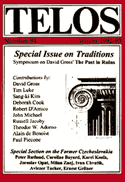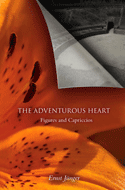 It is hard to imagine what Adorno’s corpus would look like without the deep scars left by his period of exile in the United States during the Second World War. Despite its catastrophic genesis, his exile played a constitutive role in the development of his thought, and made him, among many other things, a savagely insightful commentator on American life. This commentary on America is marked by a dialectic of fascination and disgust with his newfound home, perhaps the most “radically bourgeois country” (75) in the Western world. In particular, he was fascinated by America’s lack of cultural tradition. In his essay “On Tradition,” America serves as a model of a society ravaged by bourgeois rationalization, proudly celebrating its lack of tradition by rejecting “old world” values as archaic, irrational, and pompous. The relatively short history of the nation compounds the problem, further disconnecting us from any substantial sense of tradition or historical consciousness. We are proudly the country of the nouveau riche, possessed of power and wealth bereft of tradition and culture. This literal lack of history and evaluative rejection of tradition places America at ground zero of the crisis of tradition. Tradition survives in America in its most degraded and mutilated forms, manufactured in artificially aged consumer products and conservative “traditional” family values. The recent wave of gauche typographical décor emblazoned with the actual word “TRADITION” seems designed to confirm Adorno’s worst accusations.
It is hard to imagine what Adorno’s corpus would look like without the deep scars left by his period of exile in the United States during the Second World War. Despite its catastrophic genesis, his exile played a constitutive role in the development of his thought, and made him, among many other things, a savagely insightful commentator on American life. This commentary on America is marked by a dialectic of fascination and disgust with his newfound home, perhaps the most “radically bourgeois country” (75) in the Western world. In particular, he was fascinated by America’s lack of cultural tradition. In his essay “On Tradition,” America serves as a model of a society ravaged by bourgeois rationalization, proudly celebrating its lack of tradition by rejecting “old world” values as archaic, irrational, and pompous. The relatively short history of the nation compounds the problem, further disconnecting us from any substantial sense of tradition or historical consciousness. We are proudly the country of the nouveau riche, possessed of power and wealth bereft of tradition and culture. This literal lack of history and evaluative rejection of tradition places America at ground zero of the crisis of tradition. Tradition survives in America in its most degraded and mutilated forms, manufactured in artificially aged consumer products and conservative “traditional” family values. The recent wave of gauche typographical décor emblazoned with the actual word “TRADITION” seems designed to confirm Adorno’s worst accusations.
|
The following paper was presented at the Seventh Annual Telos Conference, held on February 15–17, 2013, in New York City. Ernst Jünger’s The Adventurous Heart: Figures and Capriccios is now available for the first time in English translation from Telos Press. Maxwell Woods spoke with the book’s translator, Thomas Friese, about the challenges of translating Jünger into English as well as the increasing relevance of the author’s writings to our current social and political landscape. Purchase your copy of The Adventurous Heart here. Thomas Friese: First impressions obviously have special value, and The Adventurous Heart was my first encounter with Jünger. It was an ideal start, since this book is a concise introduction to the worldview of the mature author. Ideally, all new readers would come to Jünger via this book—there are certainly worse ways, which are unfortunately also more common—i.e., through Der Arbeiter or Storms of Steel, or, worse still, through clichéd second-hand opinions. |
||||
|
Telos Press Publishing · PO Box 811 · Candor, NY 13743 · Phone: 212-228-6479 Privacy Policy · Data Protection Copyright © 2024 Telos Press Publishing · All Rights Reserved |
||||
 In the following, I wish to offer two reflections on the question of religion in Benjamin’s thought, the first of which pertains to the subject of translation, the second of which pertains to history. I will address the former first, for it is here, namely in Benjamin’s concept of “pure language,” that I have derived the eponymous notion of “pure religion.” These reflections will conclude in the form of open-ended questions, which I will elucidate at this time in order to orient my audience with regards to my stakes. The first question is whether the translatability of religious scripture is a condition of possibility for the multiplicity of world religions, and if so, what might the implications of this be. The second question, which I will distill from the first, is whether historicity, or what is in Benjamin the strife between historical materialism and historiography, grounds the essence, or “purity,” of religious experience.
In the following, I wish to offer two reflections on the question of religion in Benjamin’s thought, the first of which pertains to the subject of translation, the second of which pertains to history. I will address the former first, for it is here, namely in Benjamin’s concept of “pure language,” that I have derived the eponymous notion of “pure religion.” These reflections will conclude in the form of open-ended questions, which I will elucidate at this time in order to orient my audience with regards to my stakes. The first question is whether the translatability of religious scripture is a condition of possibility for the multiplicity of world religions, and if so, what might the implications of this be. The second question, which I will distill from the first, is whether historicity, or what is in Benjamin the strife between historical materialism and historiography, grounds the essence, or “purity,” of religious experience.  Maxwell Woods: In your preface to The Adventurous Heart, by Ernst Jünger, you write that “this book hooked me on the author for life.” What is it about this particular book that you found so captivating? Do you find yourself returning to this book in your studies of Jünger? Of Jünger’s work does this book hold a special place for you?
Maxwell Woods: In your preface to The Adventurous Heart, by Ernst Jünger, you write that “this book hooked me on the author for life.” What is it about this particular book that you found so captivating? Do you find yourself returning to this book in your studies of Jünger? Of Jünger’s work does this book hold a special place for you? 






